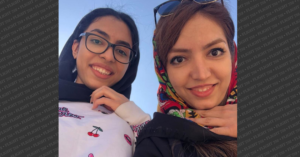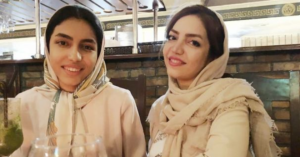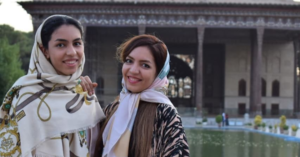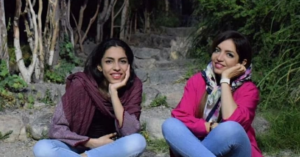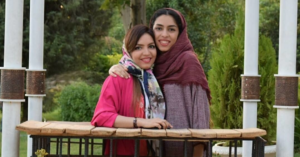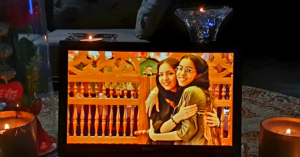Masoumeh Ghavi
“I think I made the right decision. My decision was right.”
Masoumeh thought to herself that she had made the right decision. About two months before January 8th, she had found the love of her life. Masoumeh took a trip to Iran in 2019, celebrated Yalda Night with her family, read Hafiz poems, had a traditional marriage proposal ceremony, and the night when Qasem Soleimani was assassinated, she wore her engagement ring and fell in love.
Masoumeh was born on January 17, 1989, on a cold and snowy night. She was bright and vivacious. She completed her primary and secondary education at private as well as exemplary public schools. She was always the top student and also a member of the Society of Young Mathematicians. Like her father, she was fascinated by mathematics and computers. She pursued her master’s degree in these fields. She graduated with honours from Amirkabir University of Technology (also known as Tehran Polytechnic) with a bachelor’s degree in Computer Sciences and a master’s degree in Computer Engineering, Computer Networks, and was recognized as a top student by Amirkabir University’s professors. That is why she collaborated for a long time with the Amirkabir University Research Center. She worked as an assistant professor at Payam-e Noor University, while also working as a university entrance exam advisor and a math and physics tutor.
“There’s little time left. There isn’t much time left for all the work to be done.”
After passing difficult exams abroad, she was able to obtain the majority of professional certificates from leading companies in IT, computer networks, and telecommunication engineering. At the same time, she was hired by Iran’s largest telecommunications companies. She worked as a core network engineer for Mobinnet for three years and for MTN Irancell, a large data operator in Iran, for six years. She and her colleagues’ efforts in Iran at the time enabled the implementation and maintenance of emerging technologies in the core network, such as WiMAX and 4G, which covered tens of millions of users.
During her final years at MTN Irancell, she worked hard to learn about and migrate to 5G, or the fifth-generation mobile network. Her other activities included conducting research on sensor networks as well as advanced NFV and SDN technologies. Huawei, Siemens, Nokia, Ericsson, Cisco, Samsung, and ZTE were among the major global companies with which she regularly exchanged knowledge. Few people have the required experience and expertise to work with one of these companies, let alone design, implementation, troubleshooting, and specialized certifications in each of these technologies. She travelled extensively to various countries around the world due to the nature of her work and her qualifications. She attended world-renowned telecommunications, computer, and mobile networks conferences and summits. She was always regarded as a competent and skilled employee by all executive officers.
“I’m not cut out for management. I’m far too emotional for this position. I can’t dismiss or reprimand anyone.”
Masoumeh had a knack for solving difficult and novel problems in her personal and professional life. Despite her extensive knowledge, exceptional experience, and ability to manage individuals and teams, she was never interested in management positions. She was constantly training her coworkers while also learning; all of her friends enjoyed working with her. She believed that everyone was capable of performing difficult tasks, and that training could transform individuals.
“I think I made the right decision. Yeah, my decision was right.”
Masoumeh’s greatest source of support was herself. Despite centuries of oppression against Iran on women, she was truly a powerful, charismatic, and independent woman. She was in charge of everything at home as the firstborn. She was “the big Ghavi”, according to Mahdieh, her younger sister and fellow traveler. She was able to complete all of her tasks thanks to her determination and creativity. I cannot think of a single time when she meant to do something but did not finish it.
Masoumeh had a passion for travel and driving. She drove for many years, visiting a variety of cities and major roads. She enjoyed driving any type of car, and soon after arriving in Canada, she drove her friend’s truck to a driving test center and successfully obtained her driver’s license. Music and driving. She enjoyed driving through mountains, jungles, and deserts while listening to upbeat songs.
Despite her success in Iran, she chose to immigrate. Her short-term goal was to become a director of AT&T Inc. She worked hard and was accepted to Dalhousie University in Canada to study Internetworking, which she claimed was something she did on a daily basis. Finally, she set out for Canada with big dreams in mind. She was the top student at the university, as expected. She was awarded grants to continue her education at the university. Simultaneously, due to her experience and expertise, she was recruited by Hanatech Inc. in Halifax upon her arrival in Canada, while also working on projects as a freelancer.
Without anyone’s knowledge, Masoumeh financially supported some people with disabilities who had suffered spinal cord injuries in a rehabilitation center (Hazrat Abolfazl Rehabilitation Center) in South Khorasan Province, an underprivileged area. She claimed they were her best friends, “Simple, but for myself; I like simple people; those who never believe in anyone’s wickedness; those who smile at anyone; I love simple people.”
Reza had a spinal cord injury when he was young, and only his index finger was functional. He was a friend, Masoumeh always asked about how he was doing on a weekly basis, as well as about his friends. She gave them money every month to help them with their personal matters. Since he was unable to do his personal tasks, she recently purchased a wheelchair for him so that he could go shopping alone and do his and others’ jobs as they desired. Reza is the one who has forgotten his liability and mourns Masoumeh’s death as a result of this grief. Mohammad is a child without a guardian, and we have no idea how he copes with Masoumeh’s death. He was Masoumeh’s close friend and always talked to her.
Masoumeh adored her family. Perhaps this was the reason she never considered being apart from them and marrying. Being separated from them was the most difficult thing she had ever experienced. Since nothing could stop her, she worked tirelessly to secure admission for her younger intelligent sister, Mahdieh Ghavi, who had enrolled in pharmacy with a high rank in Iran. She quickly got admission for her sister in Biology at Saint Mary’s University in Canada. Masoumeh adored her younger sister. I recall her saying once, “Even though I did not give birth to Mahdieh, she is like my daughter.” Masoumeh decided to go to Iran during the holidays between two semesters to accompany her sister on her trip to Canada because she did not want her sister to travel alone.
“I have three wishes: first, to bring my parents and family to Canada so that they can live happily for the rest of their lives and rest here after years of effort; second, to live to the end of my life with my younger sister Mahdieh and never be separated from her; and third, not to die in Canada. Every year, barely 10 people would visit my grave here. I want to be somewhere where thousands of people will come to visit me and remember me.”
Masoumeh now rests at Imamzadeh Saleh – Tajrish with her sister. The Islamic Revolutionary Guard Corps (IRGC) took away the two sisters’ passion, energy, and life on the morning of January 8th. The engagement ring, books, new car driving, management positions in large computer companies, and many other wishes were all buried in the ground, but this crime will live on forever.
No sound file available.


